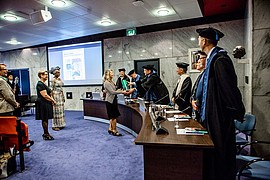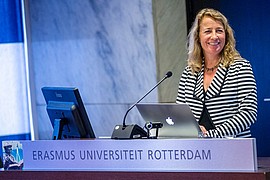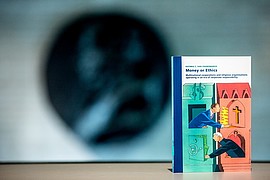PhD Defence: Katinka van Cranenburgh

In her dissertation ‘Money or Ethics. Multinational corporations and religious organisations operating in an era of corporate responsibility’, ERIM’s Katinka van Cranenburgh provides insight into the struggles of Multinational Organisations and Religious Organisations and builds on theory that can be used by business and investment managers that have an influence on society through the means of their activities.
Katinka van Cranenburgh defended her dissertation in the Senate Hall at Erasmus University Rotterdam on Thursday, 23 June 2016 at 15:30. Her supervisors were Prof.dr. L.C.P.M Meijs and Prof.dr. R.J.M. van Tulder. Her co-supervisor was Dr. D. Arenas. Other members of the Doctoral Committee were Prof.dr. A.J. Dietz (Uva), Prof.dr. S.P. Kaptein (RSM), and Prof.dr. P. Knorringa (ISS).
About Katinka van Cranenburgh

Katinka C. van Cranenburgh (The Netherlands, 1970) followed two international career paths: a corporate and an academic. Katinka finalized her studies Publicity and Culture in Amsterdam with her l’Art pour l’Argent (Art for Money) paper outlining the dimensions of investing in art. Several corporate assignments connecting business and art followed. Unified, an art book around a Dutch painter’s triptych depicting corporate life of an international coffee company, became her first ‘official’, non-academic, publication.
Employed at Heineken over a timespan of more than 16 years since 1998, she contributed to Heineken’s human rights and healthcare policy and programs in developing countries. During those years, she graduated as an International Master of Business Administration at what is now called the Amsterdam Business School of the University of Amsterdam. From 2002 to 2014 she represented Heineken at the Academy of Business in Society, serving as vice-chair of the business board and management team member. Confronted with the influence some religious investors had on a business human rights issue Katinka was involved in at Heineken, she decided to study corporate social responsibility and the potentials of religious shareholders to influence the social performance of business. Research in the field led to academic articles and practitioner reports. She also became Secretary General of 3iG, the International Interfaith Investment Group where she engaged with a network of faith institutions willing to invest socially responsible.
She started guest-lecturing at the business schools Hult-Ashridge (UK) and ESADE (Spain) where she became researcher and visiting scholar for the ESADE Institute of Social Innovation (Spain). As a direct result, Katinka now engages with the University of Barcelona as a researcher and has been assigned to set up the university's business school.
Katinka, with two partners, runs a consultancy firm since 2014, Community Wisdom Partners, specialized in CSR and social performance. Its clients; companies from the extractive industry, NGOs and business schools, exhibit Katinka's ongoing interest in the crossroads between business, civil society organisations and academia.
Thesis Abstract

It is a general assumption that Religious Organisations (ROs) are driven by religious beliefs and values, whilst multinational corporations (MNCs) are considered to be concerned about their profits, their share price and their reputation. When ROs invest in capital markets, they participate in modern economy and thereby enter a sensitive spectrum of ethical dilemmas. Since ethics is the core business of ROs, they cannot maintain a situation in which their investment portfolio would be in contradiction with those ethics. MNCs on the other hand are operating in the same modern economy, whereby - in their aim for profits and growth - they too have to deal with the ethical dilemmas that occur due to the nature and expansion of their business and the different cultural contexts in which they operate. Business managers and religious investors struggle to define the roles and responsibilities of MNCs when the products and/or activities they provide or invest in have considerable impact on society. The common assumption would be that - in an era of Corporate Responsibility (CR) – the two types of organisations can be positioned at the different ends of the scale from money to ethics. This study provides insight into the struggles of MNCs and ROs and builds on theory that can be used by business and investment managers that have an influence on society through the means of their activities. The study does not compare MNCs with ROs but demonstrates how MNCs - being confronted with social issues - and ROs, being concerned with similar social issues and investing in MNCs, deal with these issues in an era of increased CR. This dissertation is a compilation of several sub-studies that - as a whole - provide insight into the black-box of decision-making of managers and investors in the context of business ethics. The popular assumptions are validated and a more sophisticated understanding of the two different actors manoeuvring in the fields of finance and ethics is provided throughout this doctoral thesis.
· View and download Katinka's dissertation
Photos: Chris Gorzeman / Capital Images


